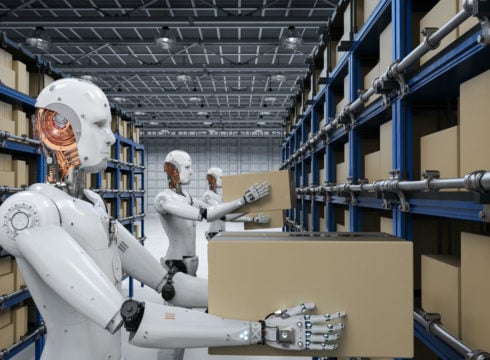SUMMARY
The value of the Indian logistics market is expected to increase from US$160 Bn to US$215 Bn in the next two years
Indian businesses are now rapidly integrating AI with their supply chain logistics
Over 90% of Indian organisations believe that AI will have a significant impact on their organisations in the future
Inc42 Daily Brief
Stay Ahead With Daily News & Analysis on India’s Tech & Startup Economy
The impact of AI on society and technology has been monumental. Machine learning is no longer just a concept – its applications have seen significant growth across various industries over the years.
We are now part of a reality where the status quo and usual processes are constantly disrupted by the precision and ever-evolving nature of AI.
This has presented a huge opportunity for the supply chain and logistics industry in India. According to the country’s Economy Survey 2017-18, the value of the Indian logistics market is expected to increase from US$160 Bn to US$215 Bn in the next two years. The benefits from effective AI implementation can range from optimising delivery routes to reduce costs and maximise speeds, to spurring innovation and enhancing productivity across the entire supply chain.
Leveraging this opportunity, Indian businesses are now rapidly integrating AI with their supply chain logistics to increase their competitive advantage in an industry undergoing a transformation.
In fact, over 90% of Indian organisations believe that AI will have a significant impact on their organisations in the future, according to Data Pulse: Maximising the Potential of AI, our survey of IT professionals across the Asia Pacific. Yet the survey also showed that only 38% of the organisations in India have implemented AI in their supply chain and logistics operations, whereas 51% of organisations in the Asia Pacific have done so.
There is huge potential for improvement in this industry, and many Indian organisations are embracing AI to seize the opportunity.
Supply Chain Management Befriends AI
AI holds immense potential to optimise logistics, owing to the fact that machine learning algorithms can analyse large, diversified data sets quickly. This means better accuracy in demand forecasting and real-time adaptation to changes in variables, thus reducing risks and enabling companies to capitalise on opportunities as they happen.
Shipsy, based in Gurgaon, is a platform that uses data-driven decision making to increase predictive supply chain visibility. Their field force task management application helps users make pickup and delivery run sheets that can be searched and scanned. In fact, the application can function even without an internet connection and lets respective companies know if the data has been synced.
AI can also help in streamlining functions and optimising routes to reduce shipping costs. Geocoding and location-based services make this possible by calculating the shortest route for delivery personnel to process timely package delivery.
Through geocoding and location-based services, companies can gain real-time traffic insights, day-to-day freight trends, thus helping them execute coherent internal operations that will lead to optimum vehicle allocation for delivery. Blackbuck is an Indian organisation that leverages these offerings of AI and provides shippers with cost-effective trucks, real-time tracking, and optimum fleet management and utiilisation, thereby making freight an easier experience.
To automate distribution and improve productivity, several established ecommerce companies like Flipkart, Jabong, Myntra, and DTDC have introduced a fleet of robots at their warehouses across India. Automation in warehouses helps increase the package sorting capacity, diminish human error, and avoid repetitive stress on employees. This results in quick package delivery, thus satisfying consumers who then begin to habitually choose services from the same company.
The Present And Future Of AI Integration
Besides established firms, there is an interesting array of Indian start-ups that use several technological methods to automate and simplify the logistics industry. These start-ups include Trukky.com, Rivigo, and LogiNext, each of which provides smart logistic solutions like truck hiring, delivery planning, and real-time tracking to both B2B and B2C organisations.
Smart implementation of data analytics, machine learning, and GPS have enabled these start-ups to disrupt traditional operational processes within the logistics sector.
All these developments strongly suggest a growing trend of AI implementation in Indian organisations and their supply chain logistics. Our Data Pulse survey found positive beginnings, with supply chain and logistics highlighted as the second most prioritised area (after IT) in which organisations in India are planning to implement AI over the next 12 months.
With robust enthusiasm from businesses and commitment from the Government of India, the existence of smarter supply chain operations seems within touching distance.
Note: We at Inc42 take our ethics very seriously. More information about it can be found here.


